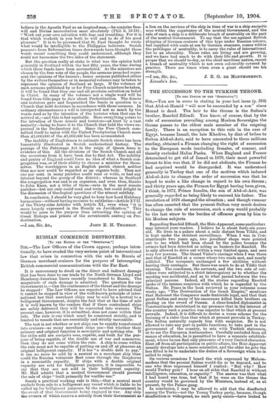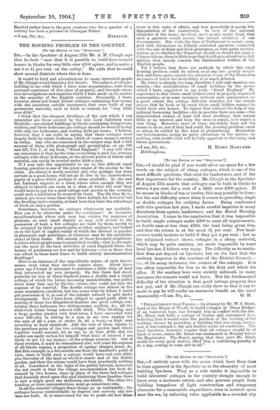THE SUCCESSION TO THE TURKISH THRONE.
[To THE EDITOR OP TIM "SPECTATOR." J
SIR,—You are in error in stating in your last issue (p. 310) that Abd-ul-Hamid "will now be succeeded by a son" since Murad is dead. The heir to the throne is the Sultan's brother, Raschid Effendi. You know, of course, that by the rule of succession prevailing among Moslem Sovereigns the throne passes to the eldest male member of the reigning family. There is an exception to this rule in the case of Egypt, because Ismail, the late Khedive, by dint of bribes to Sultan Abd-ul-Aziz, said to have amounted to three millions sterling, obtained a Firman changing the right of succession
to the European mode (excluding females, of course), and thereby excluded Halim Pasha. When England and France determined to get rid of Ismail in 1879, their most powerful threat to him was that, if he did not abdicate, the Firman he had acquired would be disregarded. It was understood generally in Turkey that one of the motives which induced Abd-ul-Aziz to change the order of succession was that he hoped to make a like change in regard to his own throne ; and thirty years ago, the Firman for Egypt having been given, I think, in 1872, Prince Izzedin, the son of Abd-ul-Aziz, was generally regarded as being likely to succeed his father. The revolution of 1876 changed the situation ; and though rumour has often asserted that the present Sultan very much desires to change the rule of succession, such a step would probably be the last straw to the burden of offences given by him to his Moslem subjects.
Regarding Raschid Effendi, the Heir-Apparent, some particulars may interest your readers. I believe he is about forty-six years old. He lives in a palace about a mile distant from Yildiz, and is kept under the strictest surveillance. When I was, in Con- stantinople two years ago, two jewellers' shops were pointed out to me which had been closed by the police because the owners had been detected as acting as bankers for Raschid. He is only allowed to drive out within a very limited space, and sees very few persons. The Grand Vizier's carriage when I was there met that of Raschid at a corner where two roads met, and nearly collided. The occupants exchanged a few civilities without leaving their carriages. But there was much to do at Yildiz that evening. The coachman, the servants, and the two sets of out- riders were subjected to a strict interrogatory 'as to whether the meeting was accidental, and as to what passed between the two principal persons. Indeed, all the stories regarding Raschid spoke of the intense suspicion with which he is regarded by the Sultan. Mr. Pears in the book reviewed in your columns some weeks ago, "The Destruction of the Greek Empire," mentions that Mehemet the Conqueror made fratricide legal, and that that great Sultan and many of his successors killed their brothers on girding on the sword of Osman. A clear-headed diplomatist in Constantinople maintained in my presence that in the interest of the country such a practice was superior to that which at present prevails. Indeed, it is difficult to devise a worse scheme for the training of a ruler than that which at present prevails in Turkey. The Sultan naturally regards him with suspicion. He is not allowed to take any part in public functions, to take part in the government of the country, to mix with Turkish statesmen, or to see the European Ambassadors. Carefully excluded from all means of education, he is permitted to have a separate establish- ment, where he can find only pleasures of a very limited character. Shut off from all participation in public affairs, the Heir-Apparent usually develops into a mere sensualist, and the older he gets the less fitted is he to undertake the duties of a Sovereign when he is called to reign.
On various occasions I heard the wish expressed by Mahom- medans that the present Sultan would die or be deposed, and to one who thus expressed himself I replied : "But why ? How would Turkey gain ? I hear on all sides that Raschid is without intelligence, education, or capacity." The answer was that what I had heard was true, but that if he were on the throne the country would be governed by the Ministers, instead of, as at present, by the Palace gang.
In conclusion, I may be allowed to add that the disaffected among the Turks—not the Young Turkey party, because, though disaffection is widespread, no such party exists—have looked to
Raschid rather than to the poor creature who for a quarter of a century has been a prisoner at Cheragan Palace.



































 Previous page
Previous page